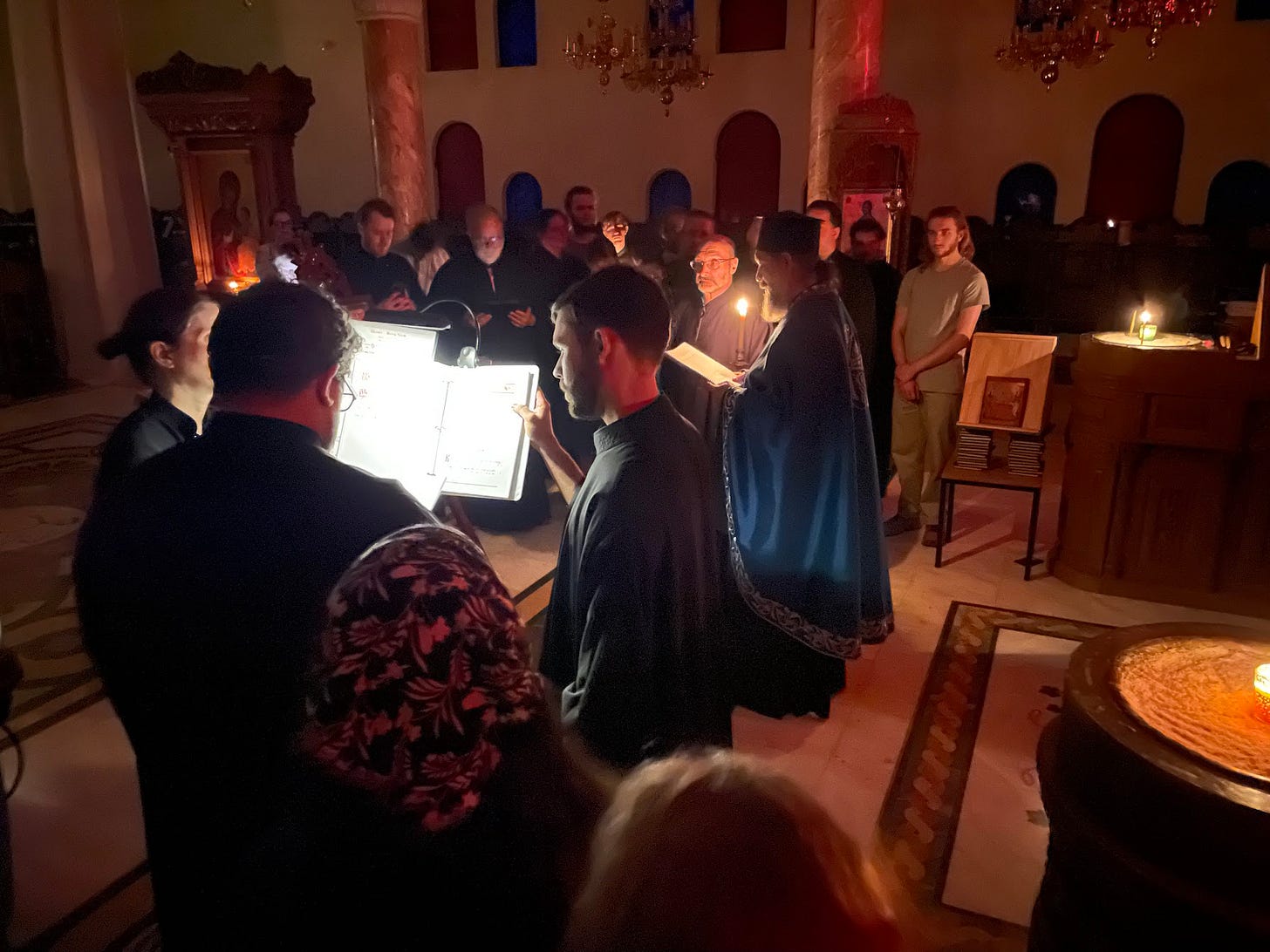Silver Door provides weekly original poems along with posts about poetry and its place in the digital age
It’s said that demonic activity reaches its heights between midnight and 3AM.
This is why the Church keeps vigil, chanting hymns of praise and glorifying God deep into the night, reclaiming that time, that territory, for the Kingdom.
It is the antithesis of art for art’s sake, which I touched on two weeks ago.
I returned home to Pennsylvania late last Saturday after a week at The Liturgical Arts Academy (TLAA) in South Carolina.
When co-workers asked if I had fun or a relaxing time at my “retreat” (it’s hard to explain Orthodoxy to most Americans, let alone Byzantine Chant), I couldn’t help but laugh.
I had a great, even life-changing, week at TLAA, but I wouldn’t call it fun or relaxing. My beginner class met each day for five hours to learn Byzantine notation, the tradition of ecclesiastical music in the Church, and the lives of great composer Saints. These lessons were sandwiched by morning and evening services in TLAA’s beautiful “chapel” (it’s really a massive church that has just not been consecrated yet).

I’m very much still digesting my experience, but something that stood out to me was how deadly serious everyone took what we were doing there. Our instructors, who also conducted the choirs at services, are among, if not at the top of their field in the English-speaking world. Instruction, at least at the beginner level, was warm though businesslike with an emphasis on technique. There was joking and banter at times, sure, but it was subordinate to the task at hand. There was absolutely no screwing around during the services, and if it even seemed like you weren’t paying attention, you would hear about it from the choir leader promptly.
All this was incredibly refreshing.
When I think of the practitioners of English language poetry today and their near total disconnect not only from their own poetic heritage, but from the life and work of the people and their spiritual plights, I can’t help but feel a smidge embarrassed. What happened? What needs to happen?
A tradition, whatever it is, needs to be passed down with reverence and intention or it will disappear. The tradition that can boast of Shakespeare, Milton, and Chaucer has been dropping the ball in this regard.
Outside of an ecclesiastical setting, I still think poetry is something to take seriously, although not quite as seriously as I have previously taken it.
There is a sacred order and there are more important things than Shakespeare. That said, a certain seriousness is essential and good when engaging in these areas. Why should a young person take Shakespeare seriously if they’ve never met someone who has?
Traditionally, Byzantine chant has used the apprenticeship model. You study under a protosaltis (an experienced chanter) and you learn through osmosis, not just their mastery of the art but through their very manner and mode of existence. It is passed down directly from chanter to chanter, Christian to Christian.
My instructor at TLAA, Samuel Herron, stressed the importance of a chanter, or anyone training to become a chanter, to follow seriously the prescriptions of the Church: fasting, confession, a daily prayer rule, etc., because the spiritual state of the chanter impacts one’s fellow parishioners, particularly as the Church’s primary means of edification is through her hymns.
I’ll leave this post with a recording composed and chanted by Mr. Herron, who for the record is a great guy, as well as a small excerpt from a text he asked us to read by Abbess Thaisia, titled “On the Duties of a Chanter.”
The text is prefaced by this line from Scripture: “Cursed is the man that doeth the work of the Lord carelessly.” (Jer. 48:10)
Consider and take heed: of Whom do you sing, to Whom do you pray, before Whom do you stand? You stand before the One before Whom the angelic ranks stand and walk with fear, covering their faces! You sing praises to the One of Whom all the heavenly powers ceaselessly proclaim: Holy, Holy, Holy, Lord of Sabaoth!





“How beautiful are the feet of him who brings good news.” It occurs to me that it is not the bringing, but the feet which are beautiful. He who brings good news must also be he who who walks in the way of that good news. The feet carry us in the way we should go. This is one whose soul and body are ordered together, living in harmony with one another. Thanks Nathan for provoking these thoughts.